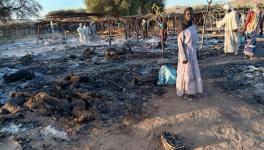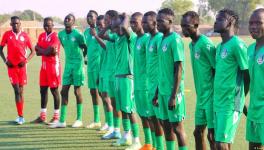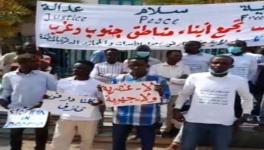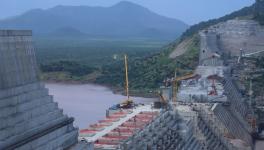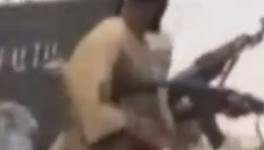Mohammed al-Khatib: The Price of Speaking Out in Khartoum
Wearing a bright white robe and a friendly smile, the new Secretary General of the Sudanese Communist Party, Mohammed Mukhtar al-Khatib greeted us in central Khartoum a few days ago. He told Al-Akhbar that his party and all the opposition are committed to the downfall of the regime.Yesterday he was arrested.
Jaafar al-Sirr: Your new position could lead to you becoming a political detainee or being under surveillance from intelligence services, as with your predecessor Ibrahim Naqd. How have you prepared yourself for this?
Mohammed al-Khatib: The party is already working in unfriendly international, regional, and local conditions. Parasitic capitalism inside the country attempts to block the work of our party. It has become an agent of foreign colonialism, through its totalitarian practices and hindrance of democracy. They are not only standing in our way, but in the way of all political parties who want to express their opinions.
In such circumstances, losing one’s freedom, being arrested and tortured, or even getting killed are all possible. When I joined the party, I expected to be arrested at any time. As a member of the Sudanese Communist Party, I am constantly under threat of arrest and torture.
JS: As a newcomer to the leadership of the opposition, are you convinced of their ability to mobilize the street? Do you present a new outlook?
MK: Certainly. During the last meeting of the opposition, a [political] paper and constitutional declaration were introduced and approved after wide deliberations. The National Umma Party even suggested a paper to be included in the constitutional declaration.
We took a decision for the opposition to take practical steps to mobilize the masses to remove the regime. There is no hope in reforming a regime that has already signed numerous agreements with the opposition and called them to unite in national action.
But experience has shown that the regime uses such calls to weather the storm. Then it breaks the agreement.
The other issue is how to work independently among the masses to mobilize them to overthrow the regime.
JS: The Communist Party’s ability to lead mass opposition movements has become weak. What can you do for the party to regain the leadership of the opposition?
MK: The Communist Party did not lose its ability to mobilize masses, but it lost some of the platforms it used to function through.
The regime neutralized the impact of mass organizations of workers, peasants, and parties. It took control and tamed them in order to serve its interests.
The regime neutralized the impact of mass organizations of workers, peasants, and parties. It took control and tamed them in order to serve its interests. It put its supporters in control, to allow them to control the country’s power and wealth.
Therefore, the masses, not just the Communist Party, were deprived of popular platforms that used to work for the interests of those segments and intervene politically in a period like this.
JS: But public opinion lost its trust in the opposition’s ability to overthrow the regime. How will you rally the masses?
MK: Recently, even the ruling party witnessed a general internal trend calling for change. This means the powers that be, who control power, believe in change, but within certain limits.
There are others in the regime who believe the regime has failed in its aims. So they want to see it go. They are attempting to do so through media campaigns against influential ruling party figures, hoping to return as saviors, with a new image, and ensure continuity.
One the other hand, some opposition parties believe that overthrowing the government would lead to strife and civil war and turn the country into Somalia. They believe that the solution should be a national [unity] government, and handing over power peacefully.
Another group of opposition parties believe that we tried this regime before and that it cannot be trusted. Therefore, it is imperative to overthrow it and its politics. Participants in the last meeting reached a consensus on overthrowing the regime completely.
JS: What do you think of the South Sudan question? What is the main reason for the crisis?
MK: The problem with the South question is that the Naivasha Comprehensive Peace Agreement [set of agreements concluded in January 2005] was bilateral, in an issue that involves several nationalities living in Sudan. All political factions should have been involved in the solution.
The government in the North deprived populations who are not involved in politics from food sources. It closed the borders with the South although there are common tribes living along that strip of land.
The government, nevertheless, did not abide by the agreement and did not make unification an attractive choice. The result was the separation of the South and other issues becoming stuck.
We neither gained unity with the South, nor did we gain peace after separation.
JS: Do you think the two countries are heading for war, especially since economic war has already started between them?
MK: Economic warfare can be immoral. The government in the North deprived populations who are not involved in politics from food sources. It closed the borders with the South although there are common tribes living along that strip of land.
These policies aggravated the situation from the commercial and economic side, instead of solving the issue amicably to allow those tribes to live in peace.
JS: If the South suffers from lack of food security, we cannot deny that the North also suffers from a crushing economic crisis and soaring prices.
MK: The government’s policies would have led to this in any case, by neglecting both agricultural and industrial projects. Money from oil was spent unproductively and squandered in an opulent fashion.
Following separation and the loss of the oil wealth [to the South], the economy began to suffer. There was a dearth of money spent on the functioning of the state and agricultural projects collapsed.
The question cannot be solved by military might. Previously, we had welcomed the Addis Ababa negotiations between the two countries [earlier this month], hoping blood will be spared.
But the breakdown of negotiations shows that the issue is becoming more complicated due to the [North] government’s insistence on imposing its agenda.
It should be noted that the war is no longer with the South, but with the New South in the Kordofan and Blue Nile regions, a result of the non-implementation of the Naivasha protocols.
JS: The government also took economic measures to limit the collapse..
MK: The people should not carry the burden of the regime’s mistakes. People today are in a state of abject poverty. Half of the schoolchildren in the capital and other cities do not have breakfast.
This is the situation of students in cities and urban areas. One can only imagine the situation in Sudan’s remote barren areas.
The government does not allow [non-governmental] organizations to provide relief to these areas. This is at a time when the government’s budget is spent in unproductive areas such as defense, in addition to the deterioration of constitutional and sovereign positions.
JS: The crisis in Darfur led the International Criminal Court to call for the arrest of president [Omar Hassan] al-Bashir. How do you evaluate the issue, especially since the country’s international relations suffered considerably due to the case?
MK: The government is going through a crisis situation. The current situation is a result of the regime’s policies in Darfur, since the beginning of the crisis in 2003.
We need to admit that the Arab mobilization we have witnessed is a step forward against totalitarian regimes, secular and otherwise. The region is witnessing a broad process of change.
These practices were even revealed by the Sudanese investigation committee, in addition to the international inquiry which identified crimes against humanity, war crimes, and even genocide.
The crisis is due to the accumulation of government policies that ultimately led to the isolation of its president. This was harmful to Sudan since the president was no longer capable of doing his job or conducting normal international relations.
Bashir remains a suspect and should appear before court to explain his position and defend himself. Otherwise, the international embargo will continue. If he was truly the president of Sudan, he should have resigned and been replaced with a new president who can move freely.
JS: The uprising of Arab masses led to Islamist governments. Is the opposition worried this will be repeated in Sudan?
MK: First, we need to admit that the Arab mobilization we have witnessed is a step forward against totalitarian regimes, secular and otherwise. The region is witnessing a broad process of change. Seeking democracy was the primary gain of the Arab Spring revolutions.
Following that, forces of international capitalism worked through their allies in the region to contain the Arab revolutions to block any serious change that would intersect with its higher interests.
Powers that were already organized reached power, the Islamist currents. I expect that they will take the same path as the Islamic Front which rules Sudan today. They will not seek to solve the people’s problems.
In the end, revolution is a trial that can keep repeating until it achieves its objectives.
This article is an edited translation from the Arabic Edition.
Get the latest reports & analysis with people's perspective on Protests, movements & deep analytical videos, discussions of the current affairs in your Telegram app. Subscribe to NewsClick's Telegram channel & get Real-Time updates on stories, as they get published on our website.










